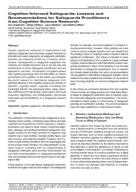Details
- Identification
- ISSN: 1977-5296, DOI: 10.3011/ESARDA.IJNSNP.2020.11
- Publication date
- 1 December 2020
- Author
- Joint Research Centre
Description
Volume: 61, December 2020, pages 39-53,
Authors: Zoe Gastelum1, Arielle Mattes1, Laura Matzen2, and Mallory Stites2
1International Safeguards & Engagements Department, Sandia National Laboratories, Global Security Division, 2Applied Cognitive Science Department, Sandia National Laboratories, Global Security Division
Abstract:
Despite significant advances in measurement and detection equipment and information analysis methods for international nuclear safeguards, all safeguards verification activities are inherently limited by a common factor: humans. Developments in safeguards equipment and methods are critically important, but so are the care and maintenance of those safeguards practitioners who are expected to use them. The domains of cognitive science and cognitive psychology offer rich information on human performance and cognition. In this article, we summarize key points relevant for international safeguards from extensive literature in the cognitive science sub-domains of attention, cognitive biases, cognitive off-loading and knowledge transfer, the prevalence effect, sleep, stress, task switching and multi-tasking, visual search and visual inspection, wayfinding, and multilingualism. We provide actionable recommendations in a safeguards-relevant context.
Keywords: cognitive safeguards, international safeguards
Reference guideline:
Gastelum, Z., Mattes, A., Matzen, L., & Stites, M. (2020). Cognition-Informed Safeguards: Lessons and Recommendations for Safeguards Practitioners from Cognitive Science Research. ESARDA Bulletin - The International Journal of Nuclear Safeguards and Non-proliferation, 61, 39-53. https://doi.org/10.3011/ESARDA.IJNSNP.2020.11

